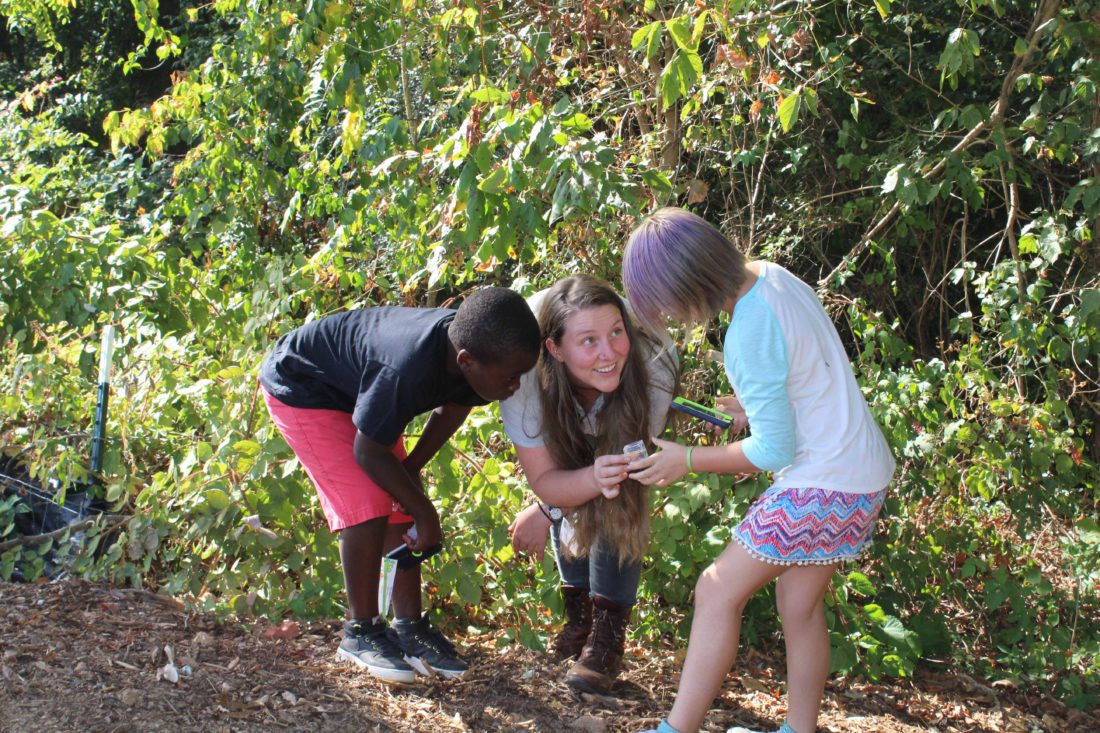All across Western North Carolina, teachers and students are headed outdoors to find, observe and photograph local wildlife as a part of ecoEXPLORE, a citizen science program developed by The North Carolina Arboretum. Kids in grades K-8 who participate in ecoEXPLORE can earn prizes and help professional researchers by cataloging the plants, animals and insects that they find in the wild — or even their own backyards.
The project has been so popular that this year the N.C. GlaxoSmithKline Foundation donated $1 million to the arboretum with the intent to expand Project ecoEXPLORE from 23 WNC counties to all 100 counties across the state. The grant will also fund the arboretum’s Project EXPLORE teacher education program and Project OWL, a teacher certification program. Project OWL stands for Outdoor Wonders and Learning.
N.C. GSK Foundation board member and Biltmore Farms CEO Jack Cecil says that the foundation has been funding STEM education projects across the state for 20 years. As a prior recipient of the N.C. GSK Ribbon of Hope Grant, he says, the arboretum proved to be a particularly good steward of the foundation’s resources.
“We gave $25,000 to Project EXPLORE (Experience Promoting Learning Outdoors for Research and Education) for teacher training and hands-on opportunities for students, and they used those funds to generate even more than that in donations,” says Cecil. “They have a well-thought-out model, and we know that they will put this more substantial grant to good use.”
Wild and free
George Briggs, the arboretum’s chairman, says that the N.C. GSK Foundation’s 2012 grant helped his organization realize ecoEXPLORE’s full potential. He now has high hopes for the expansion of arboretum programs into the rest of North Carolina. Project EXPLORE, Project OWL and ecoEXPLORE, he says, share an important mission to keep kids captivated by science and the natural world.
“Kids don’t have as much of a connection to the natural world as they used to — as we did when I was growing up,” says Briggs. “We’re trying to be the intervention that takes them outdoors and helps them understand some of the cycles of nature, some of the animals, plants and communities that are out there. We think that we can help by inspiring kids in science.”
Crucial to ecoEXPLORE’s success, Briggs says, is that the program is free for all students. Any ecoEXPLORER can check out equipment for plant and animal identification, including binoculars, insect nets, iPod Touch units and trail cameras, at the arboretum or public libraries. The arboretum also hosts free events for the program, such as the upcoming “What Goes HOP in the Night!” nocturnal amphibian demonstration on Friday, May 10, from 8-10 p.m.
“In a way, this is truly a public program. Any kid, anywhere in North Carolina once we implement this, is going to be able to access [ecoEXPLORE] through public libraries and other public partners,” Briggs says. University and community college campuses, parks and nature centers, he adds, may all play a role in the program’s expansion.
Outposts of exploration
Jen Dickenson is a librarian at the Columbus Library in Polk County, which has been a Project ecoEXPLORE HotSpot since March 2018. That designation, she explains, marks the library’s butterfly garden and hiking trail as safe spaces for ecoEXPLORERS to make their natural observations.
The library is also a GetSpot, where participants can cash in the points they earn from identifying wildlife and attending arboretum events for science-themed prizes. “Observing, photographing and identifying plants and animals is fun in itself, but then the kids also get cool prizes for doing fun activities! It’s a win-win,” Dickenson says.
One 7-year-old ecoEXPLORER from Transylvania County, going by the name CuriousBat, used her reward to lend a scientific hand to fellow students. “I earned a trail camera and helped the kindergartners find out what was eating the parsley they planted for the swallowtail butterflies,” she explains. “We found that there was a groundhog eating it!”
CuriousBat also submits her wildlife photos to a website called iNaturalist.org, where scientists identify the pictured species and designate “Research Grade” shots. Researchers then use those identifications, which are coupled with geolocation data, to understand the patterns of species distribution.
“ecoEXPLORE is important to me because I love nature and want to help. Scientists can use my pictures in their research to see where living creatures need help,” CuriousBat says.
Dickenson says that CuriousBat isn’t alone in her enthusiasm — ecoEXPLORE events at the Columbus Library regularly draw crowds of 30-70 people, including adults. She hopes that popularity will only spread once the program is available across all 100 North Carolina counties.
“It’s amazing that the arboretum is able to offer this program, events at libraries and special events at the arboretum for free to kids and their families,” Dickenson says. “And the coolest part is that their research is actually used by real scientists, so they are contributing to the scientific community.”




Before you comment
The comments section is here to provide a platform for civil dialogue on the issues we face together as a local community. Xpress is committed to offering this platform for all voices, but when the tone of the discussion gets nasty or strays off topic, we believe many people choose not to participate. Xpress editors are determined to moderate comments to ensure a constructive interchange is maintained. All comments judged not to be in keeping with the spirit of civil discourse will be removed and repeat violators will be banned. See here for our terms of service. Thank you for being part of this effort to promote respectful discussion.